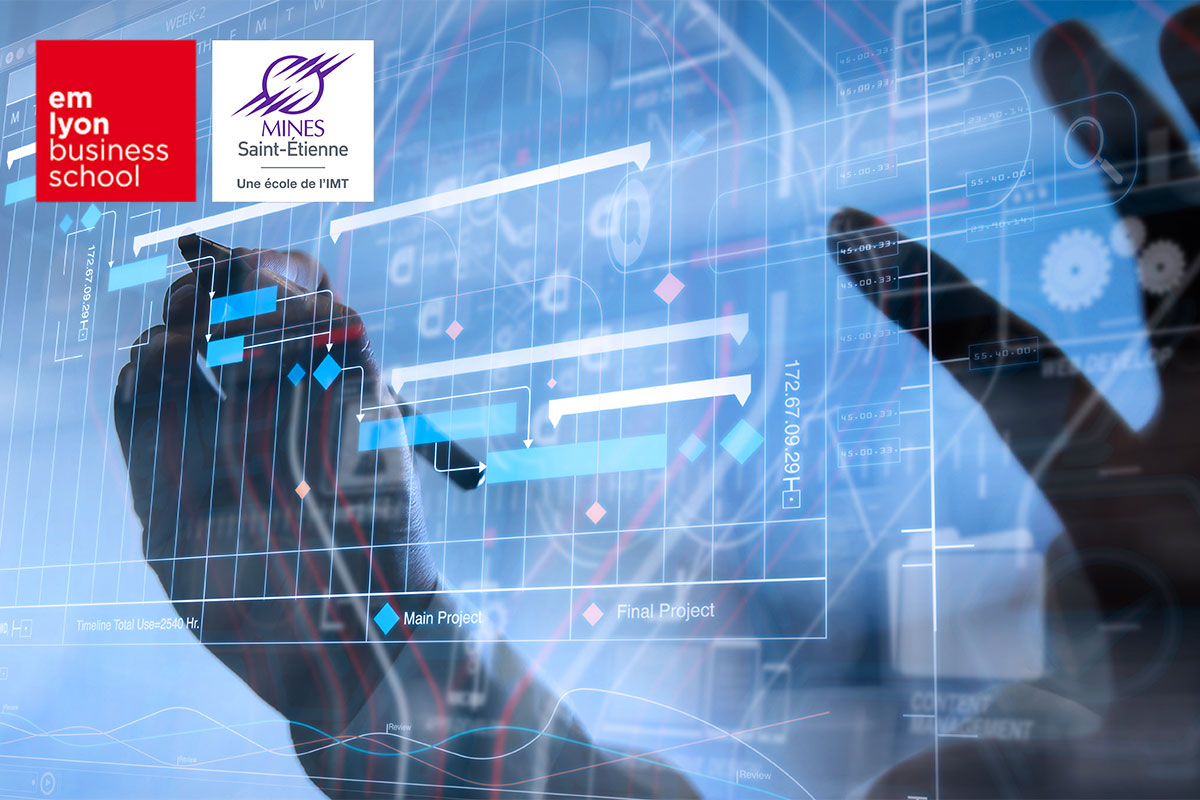Third semester in France

* Student exchange with the Master of Science (MSc) in Health Management & Data Intelligence co-accredited by Mines Saint Etienne and emlyon business school.
Third semester
For a specialisation in research and clinical vaccinology, the LIVE students will be trained in France with students enrolled in the “Master Biologie Cellulaire et Moléculaire parcours Leading International Vaccinology Education” co-accredited by Université Jean Monnet Saint Etienne (UJM) & Université Claude Bernard Lyon 1 (UCBL).
Students have an overview of the different phases needed to conduct clinical development of vaccines. Pharmaceutical industry, investigators, stakeholders and support functions share their points of view. Experts involved in these phases of development give practical details. The emergence of different infectious diseases makes it possible to show the differences between developments in a health crisis versus in times of « peace ». Students learn to design clinical phases of development and understand the importance of the data collected and their quality. They discover (i) the challenges of recruiting, (ii) why clinical development of a vaccine is different from clinical development of another drug, (iii) what happens at the time of market access and after with the surveillance of the vaccine in development.
Vaccines have been and remain a major tool in public health strategies. The growing complexity of current vaccine agendas, the ongoing introduction of new vaccines for different populations, have made decision-making more complex for vaccine producers and public health authorities. Immunization goals become difficult to track for the general public. Students learn the history of vaccination and vaccines; the place of vaccination in public health decisions; social factors influencing vaccine strategies in different countries; the anthropology of vaccine acceptance and rejection; public and media perception of vaccination and vaccines. Students become able to collect information, communicate on vaccination and vaccines, and elaborate recommendations to authorities for education, and information of the public. Practices serves to build communication during the reality project chosen by the student.
Epidemiology is the study of the distribution and determinants of disease frequency in human populations. Human diseases and especially infectious diseases do not occur at random and have causal and preventive factors that can be identified through systematic investigation in different populations, in different places or at different times. Vaccines are key preventive factors in the process of transmission and infection. Students learn basics of epidemiology, and discuss the applications of epidemiological concepts in the field of diseases which can be prevented by vaccination. The learning outcomes include understanding epidemiology and its main developments in health sciences, and knowing how to choose, justify and execute the appropriate epidemiological study set up.
L’étudiant est capable d’analyser une question biomédicale, et peut formuler une stratégie de recherche utilisant l’expérimentation animale en respectant l’état de l’art (par exemple 3R), selon les directives européennes, les lois françaises, et l’éthique. L’étudiant réfléchit sur les implications sociales et éthiques des études animales. L’étudiant développe une attitude d’apprentissage tout au long de la vie pour suivre les évolutions dans ce domaine. Le cours est en français et basé sur la législation française qui régit le droit des animaux et l’expérimentation animale nécessaire aux études précliniques. C’est une formation diplômante qui délivre un diplôme exclusivement valable en France.
The Master of Science in health and data intelligence is organized and co-accredited by two associated partners: the high business school “emLyon business school” and the “Mines Saint-Étienne” school of engineering and management: Msc HDI website .
The HDIV module broaden the view of EMJM LIVE_Innov students in health economics, business, data intelligence and innovation in the context of student exchange:
- emlyon Master students will be welcome at UCBL in the EMJM LIVE teaching units S3_Epidemiology, S3_Immunology and cancer, S3_Clinical vaccine development, S3_Communicating on vaccine and public health.
- EMJM LIVE students will be welcome at emLyon business school in the HDMI Master teaching units S3_The pharmaceutical Ecosystem, S3_The patient-centric ecosystems, S3_Ecosystems and Platform Business Models, S3_Innovation and Public Health.
Digital technologies and new business models in health: new and frequently disruptive technologies and novel user behaviors lead to the emergence of new economic structures, new organizational forms and new business models in most industries. The Healthcare Industry is also directly impacted. Together these transformations challenge and change the creation, capture, and redistribution of value. The main goals of the course are to trace these changes and discuss strategic responses through focusing on several key issues, including the emergence and design of business ecosystems and the creation of new business models fuelled by open innovation and data, notably bi-base and platform models.
Students are intendent to (i) know the historical actors involved in the healthcare sector and the new entrants in vaccine research and production; (ii) understand the disruption of existing business model by digital technology to imagine new value in the 2030 horizon; (iii) stimulate their creativity, outline the role of patient centric ecosystems in vaccine deployment; (iv) discuss the current and future healthcare system (in)equalities, addressing healthcare system and social security, supply and demand of vaccine, health prevention and promotion. (v) open their mind to the business implications of AI (artificial intelligence) technologies.
Using students’ knowledge of immunology, immunopathology and infectiology, students understand the concepts from fundamental research to leading to clinical and pharmaceutical applications in cancerology. Students will learn about the multi-hits, multi-steps and immunoediting in cancerogenesis; interactions between malignant tumours and the immune system; mechanisms of pathogen-induced oncogenesis; cancers of the immune system and consequences; preventive and therapeutic antitumor vaccinology and protection of immune-suppressed patients against secondary oncogenesis. These students also learn how to analyse, understand and manipulate interactions between tumour cells and the immune system to overcome cancer progression.
Students achieve their understanding of how to monitor and to practice monitoring of vaccine efficiency in animal models and in humans. Practical work teach the students how to monitor reactogenicity, innate immunity, humoral and cellular immune responses in mice. Practical immunology includes routes of administration in mice, management of samples for vaccine trial in humans, multi-parameter flow cytometry, ELISPOT, ELISA, microscopy, in vivo imaging, transcriptomics, proteomics and glyconomics. Measures of vaccine efficiency and correlate of protection allow students to write a practical report in the form of a research article.
The S3 language course aims to improve students’ proficiency level, taking into account their previous knowledge of the language in English, French, Spanish, German or Italian. Students will be placed in the adequate course, according to the level they reached after the first two semesters in Barcelona and Antwerp. The principal learning outcome of this teaching unit is to improve language skills.
Students gain theoretical and practical insights in neuro-immunological structures and diseases with an emphasis on pathogenesis and research development for diagnosis and biotherapy treatments.
Students can describe central nervous system cells and structure interacting with the immune system and involved in several neuro-immunological diseases, has insights in the epidemiology of these diseases, can interpret measures to diagnose or correct these diseases, explain how biological mechanisms cause these diseases and acquire a comprehensive overview of the field. Students can discuss recent scientific advances contributing to the progress of biotherapy treatments, analyse, understand and manipulate interactions between central nervous system and the immune system. They improve in speed-reading, English proficiency, and interactive scientific questioning.
Students learn and experience the benefits of managing a project to achieve specific goals in the international context of a scientific and multidisciplinary challenge in vaccinology. Students will be actors in the life of a project, from its initiation to its closure, through all the planning and execution processes related to the project and risk analysis.
Teams of (4-10) students are deployed on projects and placed in a competitive and collaborative environment where they will benefit from methodological input and support from a project advisor. They learn in a real-life situation with objectives and deliverables to work on topic that interest them; e.g. vaccinology-related Massive Open Online Course (MOOC) production, annual Research Instructive Workshop to build their “Life after LIVE”, Junior scientific committee organising the VaxInLive Symposium, Social acute questions in vaccinology, Proof of concept for innovation, organising junior interactive research workshop, etc. With innovative project pedagogy, students enjoy their project progress from one week to another along the S3 for a real result “out of the box” of their academic results.
Each student carries out a builder role and a manager role in either the same or two different projects. Student-managers decide to organise their team either horizontally or vertically in a mini-enterprise to lead their project. They are also trained by Sanofi managers with reporting of real case-studies of project management in vaccine industry. Students become able to analyse, plan, execute and control a scientific international and multidisciplinary project.
Students learn different types of formulated vaccines, types of vaccines and inactivation methods. They study particulated and nanoparticulated vaccines, recombinant vaccines, live viral- / bacterial-based vaccines and DNA- / RNA-formulated vaccines. They learn to identify and optimize the best vaccine antigens. Students understand how large scale vaccinomics and artificial intelligence foster the future development of personalized vaccinology. Practical approach for vaccine formulation, validation and qualification are framed by training at our partner VFI site.
Students have access to an advanced understanding of vaccines through different specific applications in the field of prophylactic and therapeutic vaccines against different pathogens (preclinical and clinical development). Our BIAH partner offers a specific training in veterinary vaccines. They discover the human challenge models as new way to define vaccine efficacy. They also study fundamental research that supports the development of future vaccines in onco-immunology and neuro-immunology, but also to cure allergy and autoimmune diseases.
Live_Innov
program details

innovative projects in LIVE
Students conduct Innovative projects in LIVE during the whole semester 3 in the frame of the practices linked to two teaching units: Communicating on vaccine and public health and Project management. The results allow to either organize a scientific event (research instructive workshop or junior innovative research) or build MOOC digital contents or treat social acute questions linked to vaccines. LIVE students have already created the MOOC teaching unit “Vaccinology and infodemiology” in this frame, now used by a lot of students from level L3 to M2. They co-organized some editions of the Vaxinlive Symposia. They discussed social acute questions in vaccinology. Students work on topics they are interested in and they learn in a real-life situation, advised by professional(s), how to manage their 5-month project with aim and risks to analyse, tasks to plan and execute, budget to manage, objectives and deliverables to honour.

Student exchange with the Master HMDI
The MSc in Health Management and Data Intelligence (HMDI) is co-accredited by Mines Saint Etienne, a renowned engineering school, and emlyon business school, one of Europe’s top business schools devoted to lifelong learning for entrepreneurial and international management. The courses develop new competencies at the crossroads between digital healthcare and business innovation; transform students as driven force of innovation in the health sector; the HMDI modules listed below replace the LIVE S3 optional teaching units and the practices of the reality project organized between “Communicating on vaccines and public health”, and “Project management”. Up to five students exchanged for 12 ECTS per student. The objective is to broaden the view of some LIVE students in health economics, business, data intelligence and innovation while the emlyon students are welcome to participate in the LIVE teaching units: Clinical vaccine development, Communicating on vaccines and public health, Epidemiology, and Immunology and cancer.


